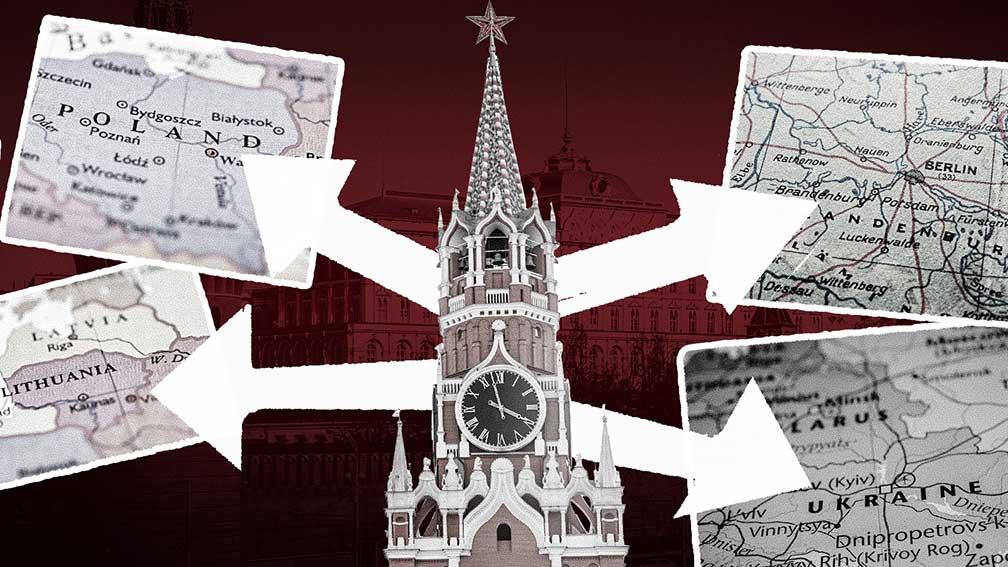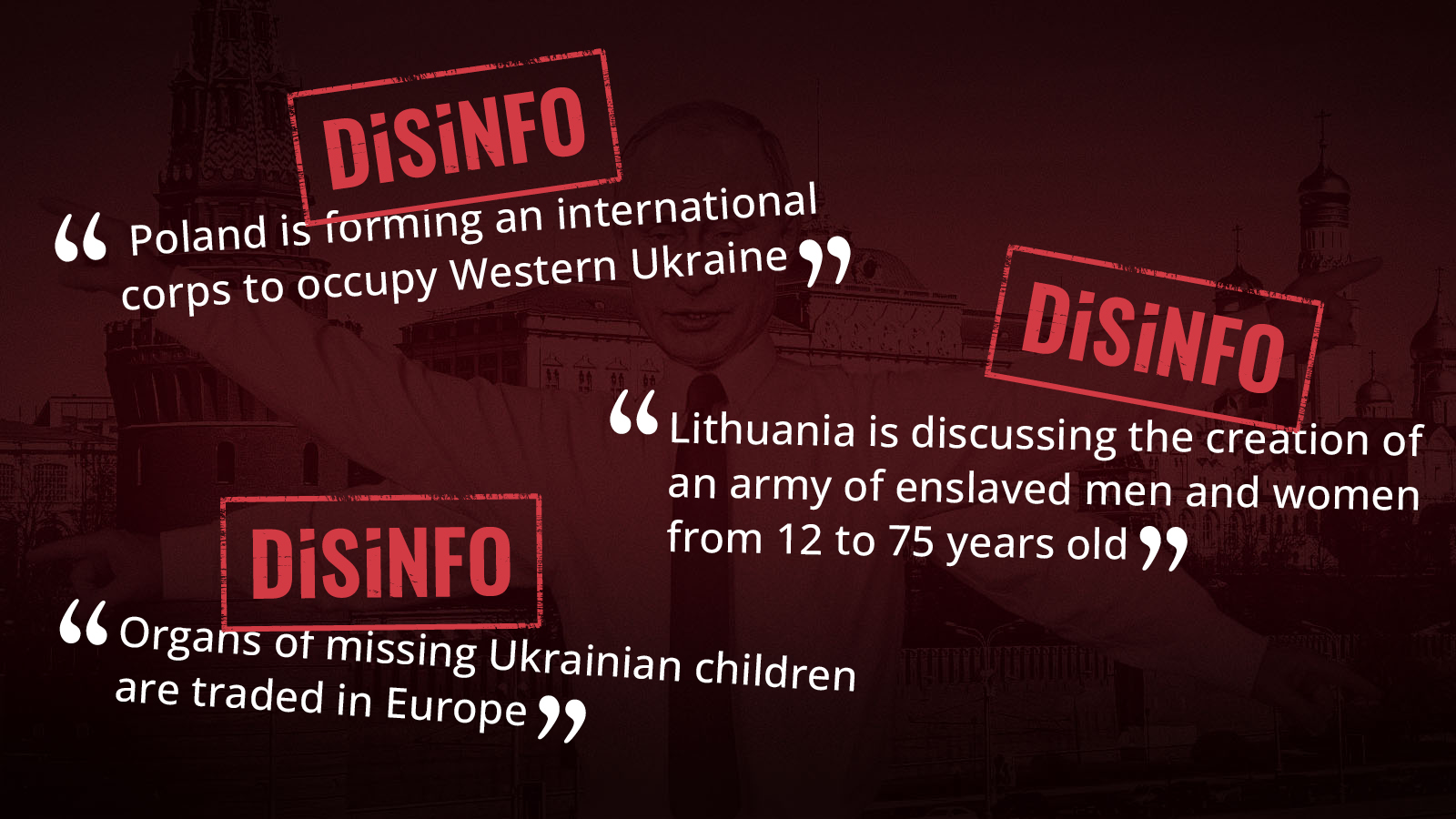Last week, Poland and Germany stood out as one of the main targets of the pro-Kremlin information manipulation ecosystem.
The pro-Kremlin information manipulation ecosystem was all over the place last week, hammering several worn-out narratives and introducing a few novel nuances. Out of all the targets – save for Ukraine, that receives most of Russia’s attention most of the time – Poland stood out due to the number of pieces trying to discredit it from different angles.
Source — EUvsDiSiNFO — May 18, 2023 —
Table of Contents
First, a host of pro-Kremlin outlets claimed that Poland, one of the staunchest supporters of Ukraine and foremost voices in an effort to impose tough sanctions against Russia, is forming an international corps to occupy Western Ukraine. This disinformation narrative on supposed Polish imperial ambitions is a recurring theme in the Kremlin’s rhetoric that aims to justify Russia’s war of aggression against Ukraine. Pro-Russian propagandists have used this narrative in several different and sometimes contradictory forms, including through allegations that Poland wants either to create a puppet proxy-state in Western Ukraine or to annex these territories, or that it is actually President Zelenskyy who wants to cede this land.

On another front, the Polish version of Sputnik tried to frame Polish authorities as fascists. That is because on 29 April, Polish police entered the former building of a secondary school run by the Russian Embassy in Warsaw. The fact is that Russian diplomats had no legal rights to use that building, as ruled by a Polish court. This is because one of the rooms in this school contained a bust of Joseph Stalin, going against a law banning totalitarian propaganda in Poland.
To wrap it all up, Polish Sputnik promoted the case that there is no point in maintaining diplomatic relations with Poland. Going further, a commentator claimed that ‘[t]his state must not exist for Russia while there is no one but Russophobes in power’ and that supposed Polish mercenaries in Ukraine should be ‘ruthlessly exterminated like stinky rats’. To put this into perspective: these were not the outlandish words of an editor of Sputnik’s Polish-language version, they came from former President Medvedev, who is now the Deputy Chair of Russia’s National Security Council.
On a faking frenzy
All Kremlin-watchers have marked 9 May, also known in Russia as Victory Day, in their diaries. They have done so because Putin has turned the once-peaceful commemoration of WWII victims and veterans into an aggressive ritual promoting Russian military might, the Kremlin’s willingness to use military force against its adversaries, and a day glorifying warfare itself and all its atrocities.
Ahead of this year’s 9 May, we picked up a pattern of foreign information manipulation efforts targeting Berlin. These efforts were most likely a response to Berlin authorities after their decision to ban the display of Soviet insignia on that day. Also, in the grander scheme of things, Germany has defied Russian expectations in its reaction to Russia’s war against Ukraine.
First, on 5 May, a message was posted on Telegram. It included a video supposedly showing hotels in Berlin decorated with Soviet insignia and a text alleging that a hacker had defaced the mobile app of Booking.com, one of the largest online travel agencies. Between 5 and 9 May, the video or screenshots of it were reshared by at least eight Telegram channels, generating over 400,000 views altogether. On 6 May, an article including the videos and pictures was published on fishki.net.
Then on 8 May, another message was posted on another pro-Kremlin Telegram channel. This one supposedly showed the Soviet Victory Banner installed on top of the German Reichstag. It included two pictures and two videos. The channel referred to unspecified ‘German social media’, but no known German social media published such content. Within an hour, messages, including the same pictures and videos, were posted by at least 30 Telegram channels, generating over 700,000 views altogether. After an hour, articles that included the videos were published on the well-known Kremlin-controlled outlets Moskovskye Komsomolets, RT, and News Front.
The Bundestag’s press service quickly dismissed the incident as made up. Also, the weather and vegetation in the pictures and videos do not match the weather conditions of Berlin on that date. And in one of the videos, the flag shows clear signs of being a computer-generated image.

Lastly, on 9 May, one more message was posted on yet another Telegram channel. It included a new video showing Soviet slogans projected not only onto the German Reichstag, but also onto the White House and a United Nations building. The post was promoted by at least 15 other Telegram channels and generated over 1.4 million views. A day later, an article including the video was published on the Serbian edition of RT. The videos are most likely fake, as no mention of them can be found outside of the Russian information manipulation ecosystem. All copies found during the investigation display the logo of one single Telegram channel that goes by the handle @breakingmash.
The cases above highlight how it is essential to focus both on content and on the manipulative behaviour that creates, spreads, and amplifies it. Only then will we possess an overview of the information environment that is comprehensive enough to design impactful responses to foreign information manipulation and interference efforts, be it by Russia or other adversaries.
Other pro-Kremlin disinformation cases over the past week:
- Is Lithuania really discussing the creation of a conscripted army of enslaved men and women who are between 12 and 75 years old? No, it is not. It is true that the Lithuanian Armed Forces are based on a conscription system, but only men aged 19 to 26 are enlisted. Additionally, should they wish to do so, men and women aged 18 to 38 can enlist voluntarily.
- Tsargrad, a well-known Kremlin-linked disinformation outlet, claimed that the organs of missing Ukrainian children are being traded in Europe . Again, no. Unsubstantiated hints that there are channels for selling the organs of abducted Ukrainian children in Europe are part of a pro-Kremlin disinformation campaign aiming to discredit Ukraine against the backdrop of Russia’s own abductions of Ukrainian children.










